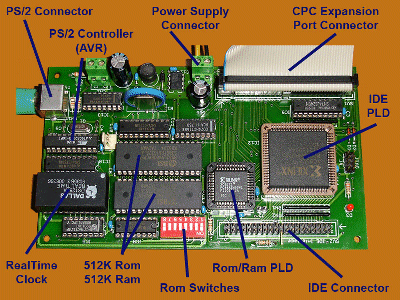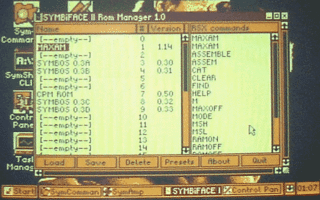Difference between revisions of "SYMBiFACE II"
(→Rom-Manager) |
(→Introduction) |
||
| Line 3: | Line 3: | ||
[[Image:Cpc-ide.jpg|200px|thumb|Prototype of the CPC-IDE interface]] | [[Image:Cpc-ide.jpg|200px|thumb|Prototype of the CPC-IDE interface]] | ||
| − | In autumn 2004 the | + | In autumn 2004 the CPC-IDE was developed by [[Dr.Zed]] with the support of [[Octoate]], [[TFM]] and [[Tolkin]]. It is the first hardware solution ever that allowed connection of IDE-harddrives and CF-cards to the CPC with the maximum possible data transfer speed. Technically the CPC-IDE interface was based on the GIDE IDE interface by Tilmann Reh. |
It was fully working, but still had a prototype state, so only 10 pieces have been produced. Some people should write software first, before the final version would be released. So fully IDE-support for FAT16 and FAT32 harddiscs has been implemented in [[SymbOS]] until Xmas 2004. | It was fully working, but still had a prototype state, so only 10 pieces have been produced. Some people should write software first, before the final version would be released. So fully IDE-support for FAT16 and FAT32 harddiscs has been implemented in [[SymbOS]] until Xmas 2004. | ||
Revision as of 15:28, 22 October 2006
Introduction
In autumn 2004 the CPC-IDE was developed by Dr.Zed with the support of Octoate, TFM and Tolkin. It is the first hardware solution ever that allowed connection of IDE-harddrives and CF-cards to the CPC with the maximum possible data transfer speed. Technically the CPC-IDE interface was based on the GIDE IDE interface by Tilmann Reh.
It was fully working, but still had a prototype state, so only 10 pieces have been produced. Some people should write software first, before the final version would be released. So fully IDE-support for FAT16 and FAT32 harddiscs has been implemented in SymbOS until Xmas 2004.
With all this, CPC SYMBiFACE II is not only an IDE interface anymore. It merges the CPC with current PC technology.
Features
CPC SYMBiFACE II contains the optimal solution for connecting a CPC with an IDE harddisc. It provides the maximum - both for the performance and for the simpleness in accessing the harddisc.
IDE Features
- Supports IDE-Harddiscs with up to 128GB
- Bigger HDDs or CD/DVD drives support possible with drivers
- Simultaneous operation of two harddiscs (master and slave):for a total of up to 256GB on your CPC!
- Transfer speed of 162KByte/s: That's as fast as copying memory inside the CPC with LDIR. In practice (loading FAT16/32 files) the speed is still about 130KB/s (SymbOS-FAT-driver).
- External power supply required: no extra load for the CPC's internal PSU
- No timing problems: Interrupts don't need to be disabled during the data transfer with the harddisc. The harddisc can operate while you play sound or doing other things with your CPC (multitasking etc.).
- Traffic activity display via a LED on the board
Additional Features
- 512KB RAM extension, which is fully compatible with the CPC 6128 and the dk'tronics ram extension
- 512KB rewriteable ROM. You can upload up to 32 ROMs, which are persistant. You can also use the ROM space as an additional RAM extension. ROMs can be switched on or off via switches or via software.
- PS/2 mouse connector. This makes it possible to connect wireless and optical mouses to your CPC.
- Realtime clock, which is fully PC compatible and provides additional 128 byte persistant RAM, which can be used to store config data.
Rom-Manager
SYMBiFACE II includes a rom manager software, which runs under SymbOS. This tool is needed for displaying, loading, saving and deleting of the 32 x 16K ROMs.
ROManager
There is a second (Pseudo-)ROM manager which alows the complete backup (and restoration) of all 32 ROMs. You can load, save, test, copy, shift, erase, park and unpark single ROMs. This ROManager runs under FutureOS. Its language interface supports German, English, French and Spanish.


